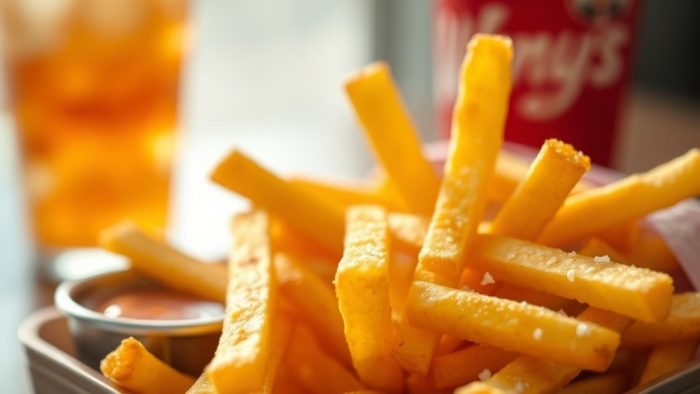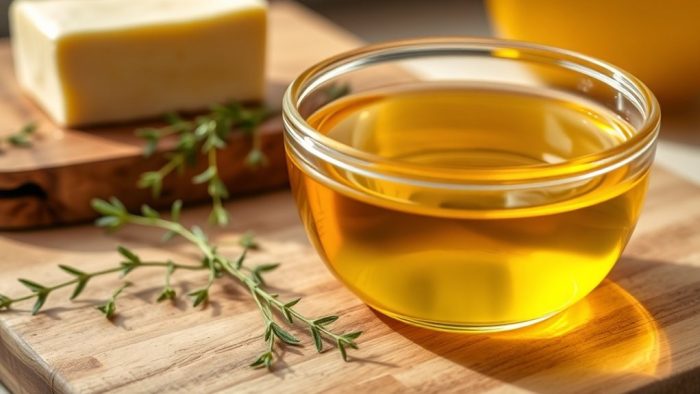Is Olive Oil Vegan
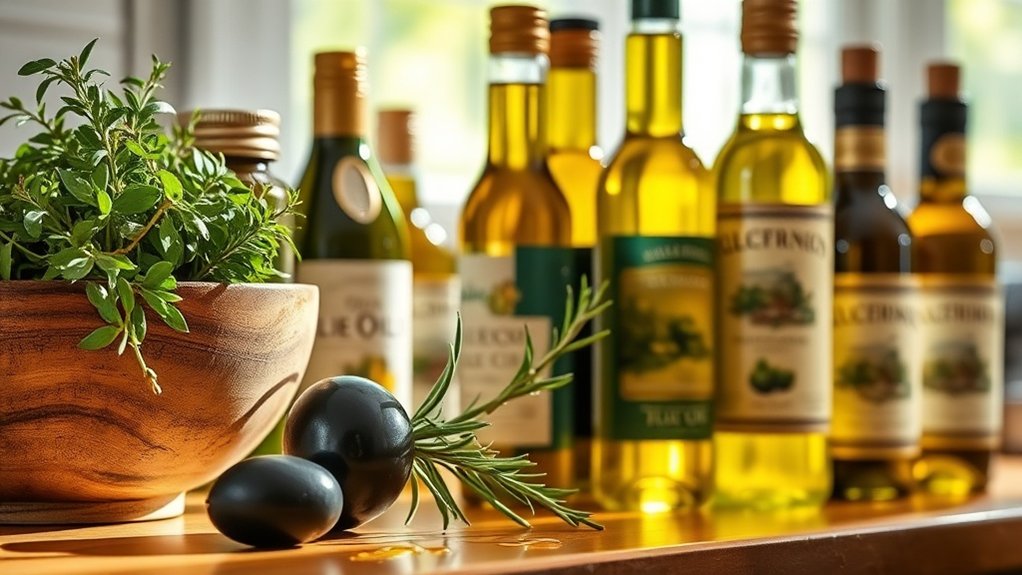
Yes, olive oil is completely vegan. It’s extracted entirely from olives—the fruit of *Olea europaea*—through purely mechanical processes involving washing, crushing, and centrifugation. No animal-derived ingredients, byproducts, or exploitation occur during cultivation or processing, making it an excellent plant-based replacement for butter and other animal fats. Rich in monounsaturated fatty acids and antioxidants, olive oil offers significant cardiovascular benefits while aligning with vegan ethics. You’ll uncover important distinctions between oil grades, ideal storage methods, and environmental considerations that impact your purchasing decisions.
What Makes Olive Oil a Vegan Product

Olive oil qualifies as vegan because it’s extracted entirely from olives, the fruit of *Olea europaea*, without any animal-derived ingredients or byproducts involved in its production.
The manufacturing process—washing, crushing, and centrifuging—relies solely on mechanical methods that don’t incorporate animal substances. This makes olive oil a staple in any plant-based diet.
You’ll find that olive oil serves as an excellent replacement for animal fats like butter in cooking and baking, providing the fats your body needs without compromising vegan principles.
It’s naturally rich in monounsaturated fatty acids and antioxidants, supporting the health-conscious aspects of veganism.
Since no animal exploitation occurs during cultivation or processing, olive oil maintains its vegan status throughout the entire supply chain, making it a reliable choice for your dietary needs.
Understanding the Olive Oil Production Process
To confirm olive oil’s vegan status, you’ll need to examine each stage of its production process.
The journey from tree to bottle involves three primary phases: harvesting and washing the olives, crushing them to extract oil through mechanical methods, and filtering the final product before bottling.
Understanding these steps reveals why olive oil remains entirely plant-based, as modern production relies exclusively on mechanical processes without animal-derived inputs or processing aids.
Harvesting and Washing Olives
The production of olive oil begins each fall when farmers collect ripe olives through methods that range from traditional hand-picking to modern mechanical shaking systems. This harvesting phase determines the fruit’s quality and oil yield.
Once collected, you’ll find that washing becomes a critical step in olive oil production. The olives pass through multiple water baths or spray systems to eliminate dirt, leaves, and any pests accumulated during growth. This thorough cleaning process guarantees no contaminants enter the final product.
After washing, workers crush the cleaned olives into a paste, releasing the oil from within the fruit. Modern facilities then employ centrifugation technology to separate the oil efficiently from the paste, maintaining a production process free from animal-derived inputs.
Crushing and Extraction Methods
Once washed olives enter the production facility, industrial crushers transform them into a homogeneous paste through mechanical grinding.
This crushing process breaks down the fruit’s cellular structure, releasing oil droplets without requiring any animal-derived inputs.
The paste then undergoes malaxation—a controlled mixing phase that helps oil molecules coalesce.
Modern extraction relies on centrifugation technology, where high-speed spinning separates oil from water and solid components.
You’ll find that hydraulic presses and centrifuges have replaced traditional animal-powered mills, making sure a completely plant-based production method.
Extra virgin olive oil comes from the first cold pressing, maintaining temperatures below 27°C to preserve nutritional integrity.
Throughout this entire extraction sequence, no animal products touch your olive oil, confirming its vegan status.
Filtration and Bottling Steps
After extraction completes, freshly separated olive oil contains microscopic particles that require removal to guarantee product stability.
You’ll find filtration methods ranging from traditional sedimentation, where gravity naturally settles impurities over time, to modern mechanical processes that accelerate clarity. This step removes residual pulp and water without introducing animal-derived products, maintaining the oil’s vegan status throughout processing.
Following filtration, producers store the oil in stainless steel tanks or dark glass containers that prevent light and oxygen degradation.
During bottling, manufacturers seal each container to preserve freshness and nutritional integrity. Quality control protocols verify purity standards before distribution.
Throughout these final stages, olive oil production remains entirely plant-based, using only mechanical and physical processes without requiring any animal-derived additives or processing aids.
Types and Grades of Olive Oil Explained
Understanding olive oil grades helps you make informed choices about both quality and nutritional value.
Extra virgin olive oil (EVOO) represents the highest quality, extracted through cold pressing without heat or chemicals, containing less than 0.8% acidity while retaining maximum nutrients and flavor.
Virgin olive oil also comes from first pressing but has slightly higher acidity (up to 2%) and less flavor intensity.
Pure olive oil blends refined and virgin oils, undergoing deodorization that creates a neutral taste profile.
Light olive oil refers to lighter flavor rather than reduced fat content—it’s a refined product that loses many health benefits during processing.
These types and grades differ markedly in acidity levels, extraction methods, and nutritional retention, directly impacting their healthfulness and culinary applications.
Nutritional Profile and Health Benefits of Olive Oil
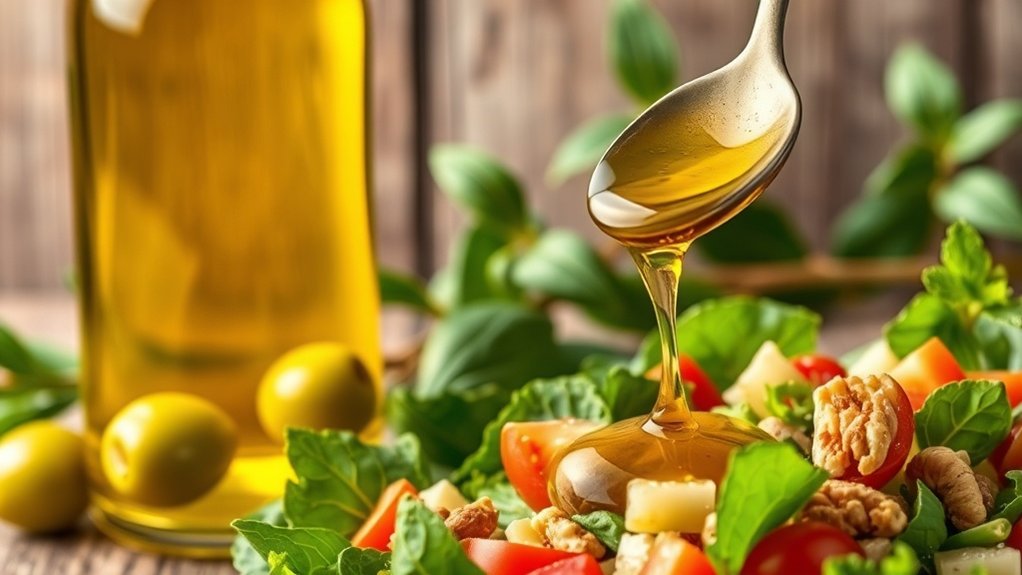
You’ll find that olive oil’s nutritional profile centers on its high concentration of monounsaturated fatty acids, particularly oleic acid, which comprises about 73% of its total fat content.
This unique fatty acid composition works alongside powerful antioxidants like vitamin E and polyphenols to deliver measurable cardiovascular benefits, including improved cholesterol ratios and reduced arterial inflammation.
Research demonstrates that regular olive oil consumption supports heart health by increasing HDL cholesterol while simultaneously lowering LDL cholesterol and protecting against oxidative stress.
Essential Fatty Acids Content
Olive oil stands out among plant-based fats due to its exceptional fatty acid composition, containing approximately 73% monounsaturated fats—primarily oleic acid (omega-9). This abundant oleic acid content reduces inflammation and lowers your heart disease risk considerably.
Beyond monounsaturated fats, olive oil provides polyunsaturated fatty acids, including essential omega-3 and omega-6 that your body can’t produce independently. These healthy fats work synergistically with olive oil’s antioxidants—vitamin E and phenolic compounds—to improve cardiovascular protection.
The nutritional value of olive oil extends to cholesterol management, with research demonstrating its ability to raise HDL (good cholesterol) while simultaneously lowering LDL (bad cholesterol).
This thorough fatty acid profile makes olive oil an ideal choice for plant-based diets seeking maximum health benefits.
Antioxidant Properties and Benefits
Beyond its impressive fatty acid profile, the antioxidant compounds in olive oil provide powerful protection against cellular damage and chronic disease.
You’ll find particularly high concentrations of oleocanthal and oleuropein—two potent antioxidants that combat inflammation throughout your body. These compounds work to reduce oxidative stress, which accelerates aging and contributes to various health conditions.
The health benefits extend to your cardiovascular system, where olive oil’s antioxidants help lower disease risk. Research demonstrates connections between regular consumption and reduced cancer incidence.
For maximum antioxidant content, you’ll want to choose extra virgin varieties, as minimal processing preserves these protective compounds. Refined oils undergo extensive processing that strips away much of their antioxidant power, making them nutritionally inferior choices.
Heart Health Support
One of olive oil’s most researched benefits is its protective effect on your cardiovascular system. As a cornerstone of the Mediterranean diet, this plant-based fat delivers powerful heart health advantages that perfectly complement your vegan diet.
The cardiovascular benefits include:
- Improved cholesterol balance: Reduces LDL (bad) cholesterol while boosting HDL (good) cholesterol levels
- Anti-inflammatory action: Oleic acid, the primary monounsaturated fatty acid, actively decreases inflammation in blood vessels
- Antioxidant protection: Vitamin E and polyphenols shield your cardiovascular system from oxidative damage
- Blood pressure regulation: Regular consumption helps maintain healthy blood pressure levels
- Reduced cardiovascular risk: Studies show notably fewer heart-related events compared to saturated fat consumption
These evidence-based benefits make olive oil an essential component of a heart-conscious vegan diet.
Environmental and Ethical Considerations in Olive Oil Production
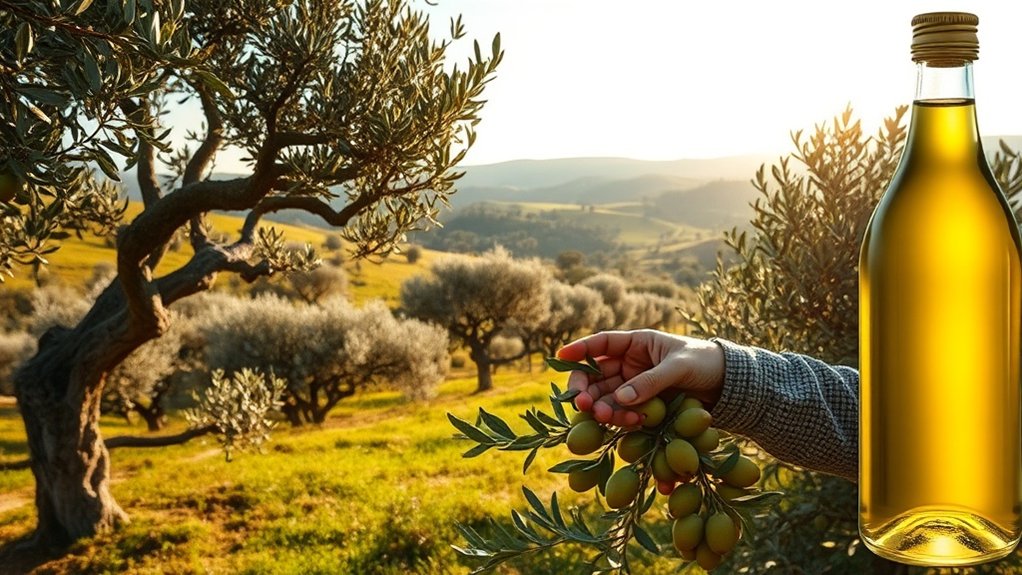
While olive oil itself contains no animal products, its production carries substantial environmental implications that ethically-minded consumers should consider.
Large-scale cultivation often involves monoculture farming, which removes native plants and causes soil erosion and biodiversity loss. Each ton of olive oil requires approximately 14,700 cubic meters of water, placing considerable strain on local water resources. Intensive farming practices frequently employ pesticides that harm beneficial insects and shake ecosystems.
You can reduce the environmental impact of this plant-based food by choosing oils from smaller, sustainable producers who implement eco-friendly farming methods.
Additionally, sourcing locally-produced olive oil minimizes transportation-related carbon emissions. These considerations help align your consumption with both vegan principles and broader environmental ethics.
Smoke Points and Culinary Applications for Different Olive Oils
Understanding how heat affects olive oil will help you maximize both its nutritional benefits and culinary performance.
Different olive oil varieties have distinct smoke points that determine their ideal cooking applications. Extra virgin olive oil tolerates medium-heat cooking at 375-410°F, while refined versions withstand temperatures up to 465°F. Quality and purity greatly influence these thresholds—impurities lower smoke points and accelerate breakdown.
Matching Olive Oil to Cooking Methods:
- Use extra virgin for salad dressings and finishing dishes to preserve delicate flavors
- Choose refined olive oil for high-heat sautéing and frying applications
- Drizzle over roasted vegetables after cooking to maintain nutritional compounds
- Create marinades with extra virgin to infuse flavor without heat exposure
- Monitor temperatures carefully—exceeding smoke points produces harmful compounds
Selecting appropriate cooking oils based on their thermal stability guarantees you’re getting ideal nutrition and taste.
How to Select and Store Quality Olive Oil
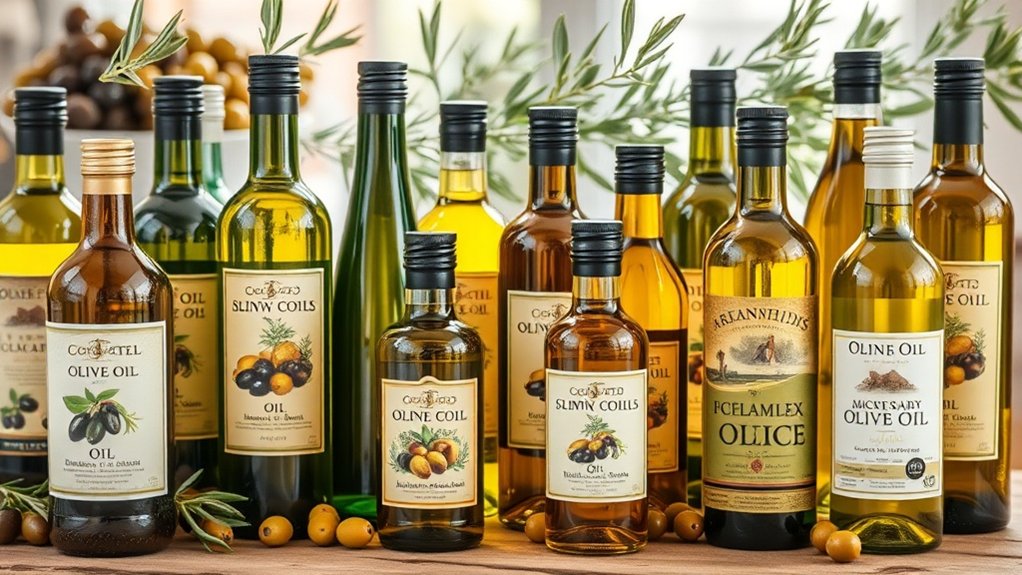
Getting the most from your olive oil starts before it reaches your kitchen.
Select extra virgin olive oil (EVOO) for maximum nutrients and flavor—it’s cold-pressed without chemicals. Check the label for a harvest date; fresher oil delivers superior taste and health benefits, ideally used within 18-24 months.
Choose bottles made of dark glass or tins, which shield the oil from light-induced degradation that compromises both flavor and nutrition.
Once home, store olive oil in a cool, dark location away from heat sources like your stove or direct sunlight. This preservation method maintains quality and extends shelf life.
Skip bulk bins entirely—air exposure accelerates oxidation, diminishing the oil’s beneficial properties and taste.
Proper selection and storage guarantee you’re maximizing olive oil’s nutritional value in your vegan diet.


